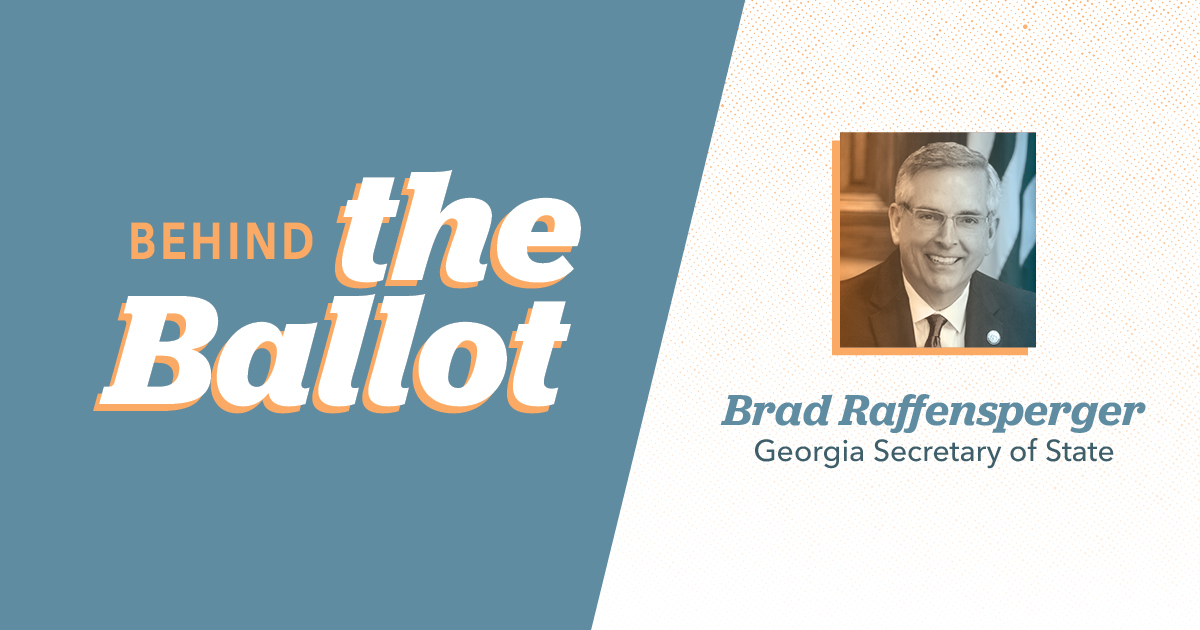
Brad Raffensperger – Georgia’s Secretary of State
Brad Raffensperger may have a high profile in the national media, but the Georgia secretary of state’s focus is the same as when he took office in 2018 — keeping elections secure, accessible and fair in his home state.
He couldn’t have anticipated when he started this job how quickly challenges would come, both from the right and the left.
“When I ran in 2018, I didn’t realize that, as soon as I took office, I’d have nine lawsuits from the losing gubernatorial candidate and her allies,” Raffesnperger said. “We’ve been pushing back on false election claims, really, since January of 2019.”
When he ran, Raffensperger says the issues were straightforward — Georgia was still using outdated direct recording electronic voting machines. His campaign message was based on security: the state needed to move to new voting machines with a verifiable paper ballot, and Raffesnperger wanted the authority to join the electronic registration information center, known as ERIC, a collaborative tool that allows states to objectively and accurately update voter rolls.
As it turned out, however, Raffesnperger encountered an elections climate that was far from ordinary.
“We didn’t expect it — I don’t think anyone could have expected it, really — looking at the scrutiny that [secretaries of state] have gone through since the recent elections,” he said.
Raffensperger says tensions around elections aren’t new. In Georgia, the problem goes back at least to 2014, and he lays blame to activist groups like the New Georgia Project, and to those who refused to accept the results of the 2016 election, as well. In 2020, Raffensperger didn’t hesitate to call out his own side of the aisle when former President Donald Trump made unfounded claims about fraud in the 2020 election.
“The challenge the President had is that we looked up and down the line to make sure that we checked out every single allegation,” Raffensperger said. “By the time we had that call with the President, we knew that the numbers were the numbers. And it was just trying to respectfully and as calmly, you know, let the President know that. ‘These are what the numbers are, sir.’”
False claims about elections — from the right or the left — are distractions. The important thing, Raffesnperger says, are that elections in Georgia are more secure and more accessible than ever before. The state has photo ID for all forms of voting, automatic voter registration and citizenship checks through the Department of Driver Services, and 17 days of mandatory early voting. Raffensperger says registration rates shot up, and today the state has more than 7.5 million voters.
“It just shows you that it’s easier to vote in Georgia, but we’ve struck that proper balance. Georgia is really doing a great job and we’re going to focus in on that.”
Raffensperger says trust and consensus building are two of the ways state leaders and everyday citizens can move away from election conflict and begin restoring trust in democratic institutions.
“Someone said that Eisenhower was a very effective president because he looked at where he could get 60-80% of people agreeing on an issue, and then he focused on that,” Raffensperger said. “He didn’t worry about the stuff where he knew he was going to get 20-40% or even 55%.”
Raffesnperger believes that change really begins on the individual level, though. Rather than focusing on policies, he says focusing on principles and character will create pathways back from the precipice. That, and a little bit of good will.
“Luke Bryan said it best — most people are good,” Raffensperger said. “So never lose sight of that: that most Americans are good people.”


